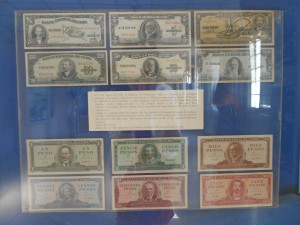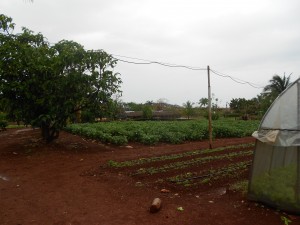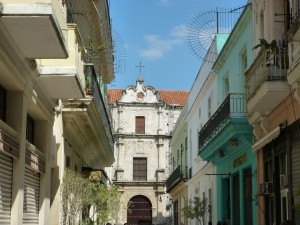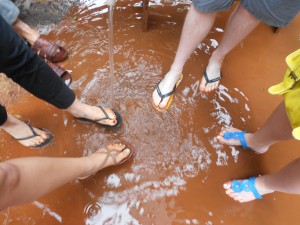This link will take you to a blog written by one of our fellow classmates, Erich Pacheco, about his thoughts on Cuba, in Spanish.
Las Palabras no son suficientes para describir a Cuba
Author: Iris
New Money
by Kyrstin Thorson 5.8.13
In 2009, the Obama Administration eased restrictions on sending remittances to Cuba. Obama removed the limit on the amount that could be sent by people in the U.S. to family in Cuba (within 3 degrees of family relationship, so long as the recipient is not a senior Cuban government official or senior member of the Communist party). Obama further eased restrictions on remittances in 2011 when he enacted policy which allows any U.S. person to send up to $500 USD per quarter to any non-senior government or Communist party official.  Obama further allowed this money to be used to fund private businesses and religious institutions. While these policy changes may seem relatively benign in the larger context of 50 years of no direct diplomatic relations, economic embargos, and military skirmishes, this policy change is actually creating very positive change for both countries and may even help foster improved relations in the future.
Obama further allowed this money to be used to fund private businesses and religious institutions. While these policy changes may seem relatively benign in the larger context of 50 years of no direct diplomatic relations, economic embargos, and military skirmishes, this policy change is actually creating very positive change for both countries and may even help foster improved relations in the future.
Private Sector Growth in the Cuban Economy
by: Natalie Cox 4.25.13
Since 2008, the Cuban government has slowly implemented a number of economic reforms that are stirring up activity in a previously dormant private sector. In small numbers, Cubans are now starting their own small businesses, buying and selling their homes, and (nearly) owning their own land. As Americans, we tend to glorify entrepreneurship, homeownership, and private property rights – so the idea that a country has functioned without these freedoms for half a century is initially horrifying, especially given the skewed, sensationalist impressions Americans already have about the Cuban socialist regime.
What is not common knowledge about this beautiful, oft-misunderstood island nation is that it’s health care system is one of the most efficient and inclusive in the world, training doctors from across the globe (yes, even the US), Cuba boasts some of the best maternal care (with maternal mortality rates lower than the US), biomedical research centers, and rural care on the globe. Cuba’s education system has also been touted as one of the most inclusive, comprehensive, and effective in Latin America, with literacy rates at over  99%. As the US struggles to reconcile an exclusive and outrageously expensive privatized health care system, and revive a dissolving public school system , we would do well to look south to our closest Caribbean neighbor.
99%. As the US struggles to reconcile an exclusive and outrageously expensive privatized health care system, and revive a dissolving public school system , we would do well to look south to our closest Caribbean neighbor.
Cuba felt the 1989 fall of the Soviet Union acutely. The nation plummeted into what is known as “The Special Period”, a time of severe economic depression in the early and mid-1990’s as Cuba lost 80% of its import and 80% of its export activity, and nearly all petroleum imports came to a screeching halt. In the early 1990’s, Fidel Castro began to allow certain avenues of self-employment, notably in the transportation sector. Since then, examples self-employment and entrepreneurship has been scarce, and private business licenses have been hard to come by.
When Fidel’s brother Raul Castro took office in 2008, he made a series of relatively subtle economic policy “updates” that were indicative of this more flexible ideologies about capitalism and its role in the Cuban economy. Now, in 2013, the effects of these reforms are beginning to be felt across Havana.
Following certain reforms after Raul’s inauguration, the Cuban government opened up 180 new categories of “self-employment”, as Raul’s new policy calls for “reducing inflated state payroll, and increasing opportunities for non-state employment”. In the streets of Havana, we now see independent produce vendors pulling overflowing carts, small cafeterias opening their doors to locals, and independent taxi drivers, barbers and salons, and private bed and breakfast operations. Currently, there are over 400,000 government licensed entrepreneurs, or self-employed citizens. And as of 2012, there were 1,736 private restaurants, 5,000 bed and breakfasts, and thousands of pizzerias, snack shops, and small cafés.
There are still significant barriers to enterprising individuals, such as the absence of a wholesale market. When Cubans decide to open their own cafeterìa or restaurant,they still pay the same relatively-high prices as everyone else for their bread, coffee, sugar, vegetables, etc., leaving little room for profit. Given this situation, many entrepreneurs need to turn to tourists as their customer base, who are willing to pay more, and who pay in the second national currency, the Cuban Convertible Peso, or CUC (pronounced kook) which is pegged to the US dollar.
However, early this April, Raul Castro announced plans for a wholesale market to support a burgeoning private restaurants, shops, and services. This is big news, for better or for worse, and more updates to come!
With activity in the private sector, there is concern that Cuba will become another island nation catering to tourists and the rich elite. However, foreign investment that is opening up is heavily regulated as to not dilute the cultural uniqueness of the nation, and even small businesses are strictly controlled. Another worry is the salary potential for the self-employed, who, with current government designated salary scale, can earn twice as much as practicing doctors. The pay scale will need to be regulated in the near future to allow for the flexibility of self-employment while not inflating earning potential. Additionally, the Cuban government is still working out the kinks in its income tax code, which merits another article on its own.
As these economic reforms take root in this shifting socialist society, what occurs to me is the heightened importance of knowledge sharing across borders and oceans. As we re-examine our entrepreneurial spirit in the US to support social innovators and social enterprises, Cuba could have much to gain from our examples. Conversely, the US should look to Cuba’s exemplary health care and education systems as we rebuild our own, with new, more inclusive funding mechanisms.
Inter Press Service
Lexington Institute – A Viewer’s Guide to Cuban Economic Reforms
The Cuban Economy Blog
How Capitalist are the Cubans? – NY Times
Book: Cuba for the Misinformed: Facts from the Forbidden Island
¿Embargo o Bloqueo?
By Hawley Harrigan
When I went to Cuba I was aware of what we call in the United States an embargo, which made it difficult, and in recent years nearly impossible, for a citizen of the United States to travel legally to Cuba. Upon arrival, I stopped hearing the word embargo as it was quickly replaced by the Cuban’s word, bloqueo. Whereas an embargo can be defined as “a legal prohibition on commerce,” a blockade is “the isolating, closing off or surrounding of a place, as a port, harbor, or city by hostile ships or troops to prevent entrance or exit.” Regrettably, these two definitions do not make the issue of US sanctions against Cuba much clearer. The United States does not have a physical presence preventing other countries from importing goods into Cuba. There is no blockade in the physical sense. The United States, however, through the Helm-Burton Act does claim the right to cut negotiations with companies that also conduct business within Cuba. This claim exceeds the bounds of stated U.S.foreign policy free trade goals and therefore affects the international trade of other sovereign nations. The United States is a huge market from which no growth-minded company wants to be excluded. Cuba, by contrast, is a tiny and unequal market player. International businesses are likely to choose to the United States, and ignore Cuba. In this sense the embargo functions much like a blockade.
Nevertheless, whatever you decide to call it, el bloqueo has made life difficult for the Cuban people. The United Nations (UN) estimates that the blockade (The United Nations refers to it as a blockade in their publications) exceeds $975 Billion in economic damages and has even led to the restriction of humanitarian aid. The UN General Assembly has called for the end of blockade in 20 consecutive resolutions. In 2011, 186 countries voted to end the blockade with just 2 – The United States and Israel – voting for its continuation. The United States continues to insist, over 50 years after imposing this antiquated, cold-war era policy, that it will lift the embargo when the Cuban government comes to respect its peoples’ human rights. The United Nations rejects this argument, calling it “stale rhetoric…designed to confuse and obscure the real relationship between the United States and Cuba” (U.N. General Assembly 11162).
After visiting Cuba, I have come to side with the United Nations and the rest of the world. Cuba is an interesting, beautiful island that has pursued education, health care, and food security through a system that is different from that of the United States. This should not be considered a crime, and the Cubans should not be punished for it. As such, the embargo/blockade has no place in today’s global economy, and indeed works to counter act the very principles of free trade and self-determination on which the United States has built its economic power.
A Taste of Co-Operation, A Day at Alamar Urban Garden
by Iris Nolasco 4.22.13
A rainy day might not be viewed to most as a day for an adventure, but my excitement grew when we neared the urban garden. Armed with my rain jacket and flip-flops I hopped off the bus into the sticky red mud. Today our class from the Monterey Institute of International Studies was going to get to explore the Alamar Urban Garden in Cuba where we would learn about the co-operative and partake in fresh food prepared on site.
It is important to understand why urban gardens like Alamar have become so essential to the Cuban people. During the collapse of the Soviet Union, Cuba lost ties with one of the few outside resources it had. In 1990’s Cuba entered into a terrible time of isolation and a lack of resources known as the “Special Period”, where almost overnight the average Cuban lost 20 pounds, and millions of dollars in food and supplies were halted. The Cuban government incentivized the agricultural movement by providing land for free to those willing to work it and produce food.
The Alamar Garden was originally founded in January of 1997 with 80 sq meters of land and only five employees. Currently the co-operative employs 174 and has expanded to 11.2 hectares. In Cuba 1.5 million tons of produce are sold by small cooperatives throughout the country. Alamar produces 300,000 tons of produce which they sell from the kiosk that faces the road. The garden is ran in a nearly sustainable manner. With the exception of one small tractor, heavy machinery is obsolete. Manure is used from rabbits, goats and oxen, the latter, is also used to turn the soil. Twelve different species of Lady Bugs are farmed and released amongst the garden, to combat other insects, providing a natural method of pest control. Additionally “repellent” plants are used in creating bio-pesticides, saving 150 tons of agro-chemicals from being released and causing harm to the environment. This garden never makes contact with industrialized chemicals. Seeds are produced on-site at the farm and in all fifteen provinces. There is an enterprise which houses and sells seeds, some of which are imported, but none are genetically modified.
While some transnational companies such as Monsanto, may argue that organic agriculture is not sustainable, Alamar Urban Garden stands by its hands-on methods of farming. In the absence of mechanized resources the garden prides itself on creating jobs where knowledge of plant, soils, and relationships among living organisms cannot be replaced by technology. Although this Urban Garden system may have been created in a period of desperation and self-sustainment, it has flourished throughout the country. The holistic sense created at the garden and by those employed there makes me wish gardens like this could live in every corner of the world. It is a truly remarkable system. A message to take away from Alamar is “Vivir con la tierra, no de la tierra”, or “live with the Earth, not from the Earth”.





